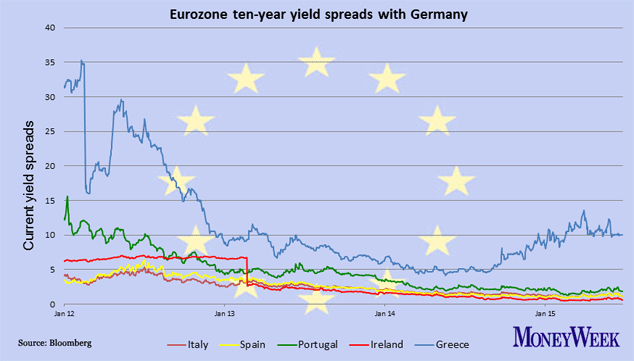
(Chart updated: 17 July 2015 – note: currently no yield data for Greek ten-year bonds)
Time’s up for Greece. It can’t pay back the €1.6bn it owes the International Monetary Fund (IMF), and a return to the drachma now looks like a real possibility.
It would be the first country to leave the eurozone – that would deliver a serious blow to the currency union’s credibility. If Greece can walk away from its debts and austerity, devalue its currency and (depending on who you listen to) get back on its feet, then why can’t anybody else?
Portugal might be watching for the answer to that question. It has also been through a eurozone bailout, sluggish growth and painful reforms. It’s a similar story across the border in Spain. There, support for the anti-austerity party, Podemos, has been steadily rising. If spending cuts and tax rises don’t bring the required economic relief, then why bother?
Not so fast, Ireland will say. “We took the bitter medicine and came out the other side” (see the vertical dip in the red line in the chart above). “But if we’d known you could walk out, we might have done that ages ago.”
Perhaps the European Central Bank can prevent any ‘contagion’. But equally, it doesn’t take too great a leap of the imagination to see the entire euro project unravelling from here.
That raises another question: who could be next?
The above chart compares the borrowing costs of Italy, Spain, Portugal, Ireland and Greece against Germany’s – the eurozone’s economic powerhouse – to produce the ‘yield spread’. The higher the yield spread in theory, the closer a country would be to ditching the euro.
Relative to Germany, we can see Portugal has the next highest borrowing costs – although nowhere near as bad as Greece (in blue).
So, for now, markets don’t seem to be expecting a domino effect. Either that or they don’t yet expect Greece to leave. But if you’re at all concerned about the impact of a Greek exit, these spreads are the things to watch. We’ll be keeping them up to date.
• The latest on Greece and the eurozone crisis.